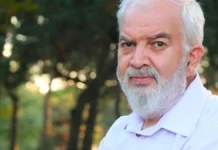In the latest example of self-censorship in Turkey, commentators on Turkish TV channel S Sports, the official broadcaster of the NBA games in the country, did not mention Boston Celtic center Enes Kanter’s name during the Eastern Conference finals for fear of provoking the Turkish government’s ire.
S Sports has not broadcast a single game in the past three years in which Kanter’s NBA teams played including last year’s Western Conference finals. The Eastern Conference finals are the first series of games that include Kanter’s team aired by the sports channel.
inanılmaz şeyler oluyor..
S Sport'a göre;
Boston Celtics 4 kişi oynuyor..@EnesKanter sayılar atıyor
Ribaundlar alıyor ama
Türk Spikeler göremiyor..Aman Allahım kör oldular 😯 pic.twitter.com/6rTKBJtojA
— Muhammet Ali Toksoy (@MA_Toksoy) September 18, 2020
A Turkish journalist shared a short video of the moments when Turkish commentators try not to mention Kanter as he got an offensive rebound, scored and used a free throw during the same play with the comment, “They must be blind.”
Kanter is an outspoken critic of Turkish President Recep Tayyip Erdoğan’s increasingly authoritarian policies and human rights record. Turkish prosecutors are seeking a four-year prison sentence for his alleged membership in the Gülen movement, a religious group inspired by US-based Turkish cleric Fethullah Gülen.
Erdoğan has been targeting followers of the movement since the corruption investigations of December 17-25, 2013, which implicated then-Prime Minister Erdoğan, his family members and his inner circle.
Dismissing the investigations as a Gülenist coup and conspiracy against his government, Erdoğan designated the movement as a terrorist organization and began to target its members. Erdoğan intensified the crackdown on the movement following a coup attempt on July 15, 2016 that he accused Gülen of masterminding. Gülen strongly denies involvement in the abortive putsch or any terrorist activity. Following the allegations, Gülen called on the Turkish government to allow for an international investigation.
Turkey had revoked Kanter’s passport in 2017 and attempted to have him deported him from Romania on May 20, 2017 during one of his international trips. His passport was briefly seized by the Romanian police upon a request from the Turkish government. The NBA said it had worked with the State Department to ensure Kanter’s release in Romania.
Once he landed in the US, Kanter revealed that the Turkish government had also tried to catch him in Indonesia. “I was sleeping around 2:30 or something and my manager knocked on my door. He said the Secret Service and the Indonesian army were looking for me because the Turkish government told them I was a dangerous man,” Kanter said.
I'm being held at Romanian airport by Police!! pic.twitter.com/uYZMBqKx54
— Enes Kanter (@EnesKanter) May 20, 2017
Kanter’s Twitter account is banned in Turkey.
The self-censorship of the Turkish commentators comes as no surprise given the Turkish government’s heavy-handed response to any views or comments that run contrary to its own narrative. International non-profit Reporters Without Borders (RSF) describes Turkey as “the world’s biggest jailer of professional journalists.” According to the Stockholm Center for Freedom’s “Jailed and Wanted Journalists in Turkey” database, 172 journalists are currently behind bars, while 167 are wanted and are either in exile or remain at large.
Government censorship is also widespread on social media. According to Turkey’s Ministry of Interior, Turkish police investigated 14,186 social media accounts in the first seven months of 2020, taking legal action against 6,743 of them on charges of spreading terrorist propaganda, inciting the public to hatred and enmity, instilling fear in and causing panic among the public or containing provocative content.
Following the coup attempt, the Turkish government declared a state of emergency and launched a massive crackdown on followers of the Gülen movement under the pretext of an anti-coup fight. Over 540,000 people were detained on terrorism-related charges, more than 80,000 were arrested or imprisoned and over 150,000 public servants, including 4,145 judges and prosecutors, were summarily removed from their jobs for alleged membership in or relationships with “terrorist organizations.” In the same period 164 media organizations, 1,769 NGOs and 1,058 educational institutions were shut down without any due process.















